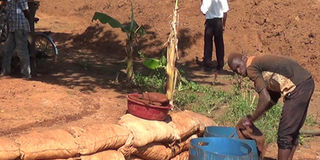Residents cry foul over Busia’s polluted rivers

Mineral search. A man searches for gold on the banks of River Namukombe. Artisan miners have been accused of using mercury, which is environmentally dangerous, to extract gold. PHOTO BY DAVID AWORI
What you need to know:
Effect. They say chemicals from the mining areas flow into the rivers hence polluting the water sources and putting their lives at risk.
Residents of Buteba and Busitema Sub-county in Busia District have asked government to stop mining activities that are polluting River Namukombe and River Okama.
Locals say the mining activities have silted and affected the flow of water.
Mr Tom Etaru Ekisa, a resident of Syanyonja Parish in Buteba Sub-county, said the two rivers have been their source of livelihood but now they are polluted with chemicals.
“These rivers have provided us with fish and fertile soils for agriculture, but they have been polluted by miners. Our lives are at risk,” he said.
River Namukombe and River Okame flow into River Malaba, which join River Nampologoma to flow into Lake Kyoga.
The miners are allegedly using mercury, which is mixed with gold-containing materials to form a mercury-gold amalgam, which is then heated and vapourised to obtain the gold.
Mr John Wafula, another resident, said failure by the government to put in place policies to regulate mining and sensitise the public on the dangers of the activities has put their lives at risk.
“The soils, sand and chemicals from the mining areas are finding their way into rivers. This has rendered our soils unproductive,” he said.
The Busia District chairperson, Mr Geoffrey Wandera, said during a consultation meeting on the Mining and Minerals Bill, in Mbale Town on Friday, many officials complained that the activities have degraded the environment.
“Residents are drinking contaminated water due to unregulated mining activities by unlicensed companies,” he said.
Mr Wandera said government should stop the miners from using hazardous chemicals such as mercury.
Mining company responds
Mr Godfrey Benesa, a member of Tiira Small Scale Mining Company, said they have since adopted the use of borax as opposed to mercury in the extraction of gold because it is environment-friendly.
“We are now using borax to extract gold, because it is not dangerous to people’s lives and the environment like mercury,” he said.
Mr Godfrey Benesa, a miner attached to the company, said government should speed up the enactment of a new mining law.
“If this Bill is passed, the miners will be licensed and regulated,” he said.
Mr Vincent Kedi, the assistant commissioner in the Ministry of Energy and Mineral Development in charge of licence administration, said such a Bill will address the challenges of environment degradation.
“Most of the operations have been illegal in nature and we have little control of mining activities in the current law,” he said.
However, Ms Caroline Nakajubi, an expert in extractives, working with ActionAid International, said the new Bill should give more powers to local governments in as far as licensing of miners is concerned.
“This Bill still gives the minister a lot of powers, something, which needs to be checked because I think, the process should be decentralised,” she said.
The State Minister for Minerals, Mr Peter Lokeris, said government intends to ensure the mining sector is effectively managed without destroying the environment.
Testing for mercury
Dr Victoria Mukasa, an official at Uganda National Association of Community Health (UNACOH), said tests were carried out last year by the directorate of the government analytical laboratory in the gold mining Parish of Tiira in Sikuda Sub-county. Results showered that crops and soils had samples of mercury.
“Even the blood, urine and physical samples tested from 10 miners turned out to be positive for mercury and soil and crop tests in some areas showed contamination,” Dr Mukasa said.



